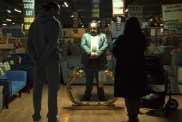Rating: 8 out of 10

Directed by Angelina Jolie
Story:
After being drafted into the military during World War II, Olympic runner Louis Zamperini (Jack O’Connell) finds himself acting as bombardier in a plane. While flying on what should be a routine rescue mission, their plane crash lands in the Pacific leaving Zamperini and two of his crew stranded for almost two months at sea with little food and water. They’re finally rescued by a Japanese ship, who promptly throws the survivors into a POW camp where things get progressively tougher for Zamperini.
Analysis:
The less you know about the life of the late Louis Zamperini, the more you’ll be able to appreciate what director Angelina Jolie and her cast have achieved in telling his story in such an effective way. We meet him while he’s already part of the crew of an Air Force plane flying over the Pacific and having to land their damaged plane after a firefight. We then cut back to Louis as a child, being raised by religious Italian-American parents and getting into trouble as he faces racism and gets into trouble with the police. When others realize that Louis is a fast runner, he becomes the high school’s track and field star, eventually getting all the way to the 1936 Olympics in Berlin.
There are moments during the first half hour of “Unbroken” where it feels like its treading along a fairly standard biopic structure with flashbacks to Zamperini’s childhood being the weakest part of the movie. Those flashbacks are filled with the type of inspiring moments meant to manipulate the viewer’s emotions to feel for the character, but he really hasn’t had that tough a life growing up in Torrance, California. The dialogue isn’t the greatest, surprising when you consider the prestige of the four screenwriters required to adapt Laura Hillenbrand’s novel.
Once we return to Zamperini’s crew flying over the Pacific, things start to get far more intense as it diverts from the usual biopic tropes, and becomes more about survival than him being a hero.
There’s little question that the performance by up ‘n’ comer Jack O’Connell is the defining element of the film and one that leaves the biggest impression. O’Connell once again changes his appearance quite dramatically from other roles he’s played this year. Hearing his convincing ‘40s American accent adds to the way he disappears into the role of Zamperini. Domhnall Gleeson is equally unrecognizable as Louis’ devout colleague Phillips, who ends up adrift at sea with him in a raft surrounded by sharks. The urgency of their situation in terms of surviving this situation is evident in this extended section that maintains the interest despite the limited setting.
The film’s biggest turnaround comes when Zamperini and Phillips are caught by the Japanese and taken to separate detainment camps where the former encounters the cruel Watanabe, referred to as “The Bird,” and played by Japanese rocker Miyavi. Wielding a bamboo cane, he strikes Zamperini violently with at any given chance. Watanabe uses the American Olympic athlete as his scapegoat on which to work out his issues. When Zamperini refuses to go on Japanese propaganda radio to say bad things about America, he’s put back under Watanabe’s vicious thumb. Miyavi looks almost effeminate in uniform and never raises his voice when trying to humiliate Zamperini though his eyes often give away the psychosis that drives the man.
The film is brutal to watch at times, especially the physical abuse O’Connell undergoes, but also watching the actor’s muscular and athletic physique deteriorate into a scarecrow of a man, covered from head to toe in scars and bruises. The film culminates with the surviving POWs in a work camp lugging coal with Watanabe continuing to focus his ire on Zamperini, who struggles to not give the cruel commanding officer the satisfaction of besting him.
Jolie proved her ability as a filmmaker able to deal with tough subject matter in 2011’s “In the Land of Blood and Honey,” and “Unbroken” follows suit with an equally daring film with no big stars in front of the camera, putting even more pressure on Jolie to carry things from behind the camera. Fortunately, she has one of Hollywood’s top cinematographers in Roger Deakins, working with her, as well as the luscious scoring skills of Alexandre Deplat, both of them enhancing what is a fantastic cinematic experience.
The Bottom Line:
A stirring and inspirational story like this could have easily been emotionally manipulative, but Jack O’Connell’s performance and the fantastic work done by Jolie and her team make this a far more effective story than one might expect.
Unbroken
-
Unbroken

-
Unbroken

-
Unbroken

-
Unbroken

-
Unbroken

-
Unbroken

-
Unbroken

-
Unbroken0008

-
Unbroken0009

-
Unbroken0010

-
Unbroken0011

-
Unbroken0012

-
Unbroken0013

-
Unbroken0014

-
Unbroken0015

-
Unbroken0016

-
Unbroken0018

-
Unbroken0019

-
Unbroken0020

-
Unbroken0021

-
Unbroken0022

-
Unbroken0023

-
Unbroken0024

-
Unbroken0025

-
Unbroken

-
Unbroken

-
Unbroken

-
Unbroken

-
Unbroken

-
Unbroken

-
Unbroken

-
Unbroken

-
Unbroken

-
Unbroken

-
Unbroken

-
Unbroken

-
Unbroken

-
Unbroken

-
Unbroken

-
Unbroken

-
Unbroken

-
Unbroken

-
Unbroken

-
Unbroken

-
Unbroken

-
Unbroken

-
Unbroken










